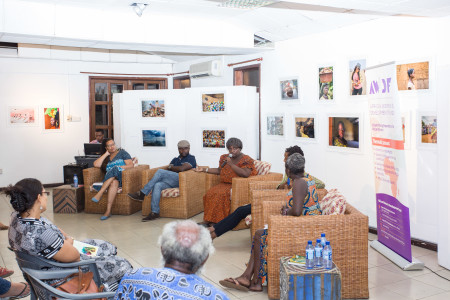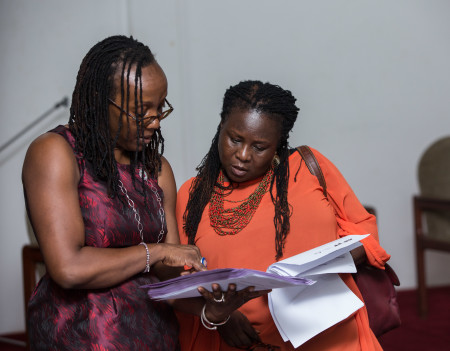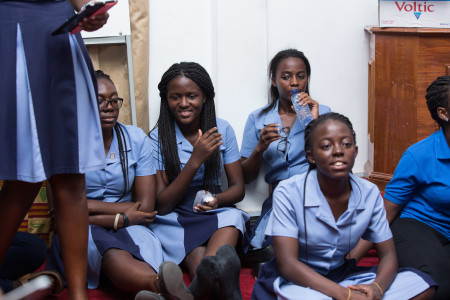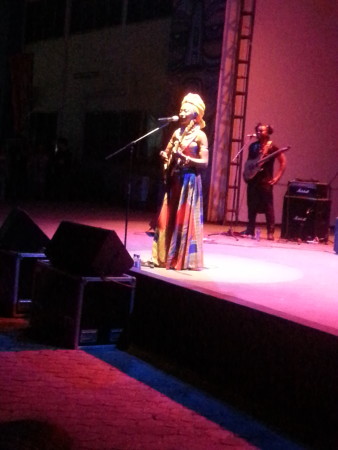International Women’s Week: A celebration of Voices and Truths.

At AWDF we recognize the importance of celebrating women in our daily lives and during the month of March we especially invite the public to join us in this joyous task. This year, we marked the day with three special events, each of which had a strong recurring theme: Voices and Truth.
AWDF believes conversations like these are vital to changing stereotypical notions about African women and their role in society.
Renowned Ghanaian photographer Nana Kofi Acquah’s photo exhibit “Don’t Call Me Beautiful,” was a work that focused on displaying the complexity and variety of the African woman, and in that vein it definitely succeeded. AWDF held a panel discussion at the close of the exhibition, on 8th March – International Women’s Day – to explore these themes and to question the relevancy of the word resilience in connection to the African woman. The event took place at Alliance Francaise Accra.
The room was filled with members and staff of Alliance Francaise Accra and an engaged public. At times contentious, never dull, the panel, which was moderated by Kinna Likimanni, discussed notions of beauty, colour and skin bleaching, with active participation from the audience.


Our second panel discussion organized jointly with the Centre For Gender Studies and Advocacy ( CEGENSA) on Friday March 11 was another opportunity to tackle thorny issues.
The theme “About Last Night,” focused heavily on student relationships, date rape, and sexual abuse on Legon Campus and the ways in which victims are treated both by the institution and their peers. The room was full of students from the University and some students from SOS-Hermann Gmeiner International College. A few young undergraduate women were brave enough to share harrowing stories of their own abuse that they’d suffered on Legon Campus and the lack of response that followed it.
“He walks around here like this untouchable, charming guy and no one knows that this is what he really is,” said a young woman about the male student friend who assaulted her.
And she was not the only one– many students and people in the room expressed the unfairness of society’s expectations for young girls and the need for women to be the ones who guard themselves from sexual assault. It was clear that there was much to discuss, and the event ended on a note of bittersweet hope for all involved.
One high note was the presence of the SOS students (all female), whose vocal and confident contributions underlined their heightened self-awareness and knowledge of women’s rights and feminism.
“They were the real stars of tonight. They absolutely made my day – and the entire programme,” said Prof. Audrey Gadzekpo, who acted as moderator for the discussion.

We wrapped up the week with a celebration of music at Accra’s cultural mecca Alliance Francaise, where the Francophonie festival began with a concert by Malian singer Fatoumata Diarawa.
At AWDF we recognize the importance of the arts as a tool to promote social justice and a medium to nurture and raise the profile of African women and their achievements. Teaming up with Alliance Francaise and other partners for Diawarra’s concert was a way in which we could salute one of the continent’s brightest talents.
After a soulful curtain opener by AWDF’s communications staffer “Suga” and high-energy Ghanaian musician Sherifa Gunu, Fatoumata hit the stage for an unforgettable night of music and dance. Two of Fatoumata’s songs, “Oumou” which celebrates African Female Artistes and “Boloko,” a song with a strong anti FGM message, reinforced the power of music as a tool for social change.
From the various ways in which we portray women in art to the lives women lead in silence, these events examined the truth of African women, finding it painful, complicated and inspiring.
African women and their achievements and struggles must be celebrated and discussed. And the spirit of International Women’s Day, that week and month must be carried through the entire year if we are to reach the goal of gender parity. For us at AWDF we will continue to strive to see that women are understood as deserving of recognition, celebration and a voice.
